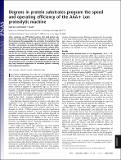Degrons in Protein Substrates Program the Speed and Operating Efficiency of the AAA+ Lon Proteolytic Machine
Author(s)
Gur, Eyal; Sauer, Robert T
DownloadGur-2009-Degrons in protein s.pdf (470.7Kb)
PUBLISHER_POLICY
Publisher Policy
Article is made available in accordance with the publisher's policy and may be subject to US copyright law. Please refer to the publisher's site for terms of use.
Terms of use
Metadata
Show full item recordAbstract
AAA+ proteases are ATP-fueled machines that bind protein substrates via a degradation tag, unfold the molecule if necessary, and then translocate the polypeptide into a chamber for proteolysis. Tag recognition is normally viewed as a passive reaction. By contrast, for the AAA+ Lon protease, we show that degron tags are also regulatory elements that determine protease activity levels. Indeed, different tags fused to the same protein change degradation speeds and energetic efficiencies by 10-fold or more. Degron binding to multiple sites in the Lon hexamer appears to differentially stabilize specific enzyme conformations, including one with high protease and low ATPase activity, and results in positively cooperative degradation. These allosteric mechanisms allow Lon to operate in either a fast or slow proteolysis mode, according to specific physiological needs, and may help maximize degradation of misfolded proteins following stress-induced denaturation.
Date issued
2009-10Department
Massachusetts Institute of Technology. Department of BiologyJournal
Proceedings of the National Academy of Sciences of the United States of America
Publisher
National Academy of Sciences (U.S.)
Citation
Eyal Gur and Robert T. Sauer, “Degrons in protein substrates program the speed and operating efficiency of the AAA+ Lon proteolytic machine,” Proceedings of the National Academy of Sciences 106, no. 44 (November 3, 2009): 18503 -18508.
Version: Final published version
ISSN
0027-8424
Keywords
AAA+ protease, Allosteric control, Degradation tags